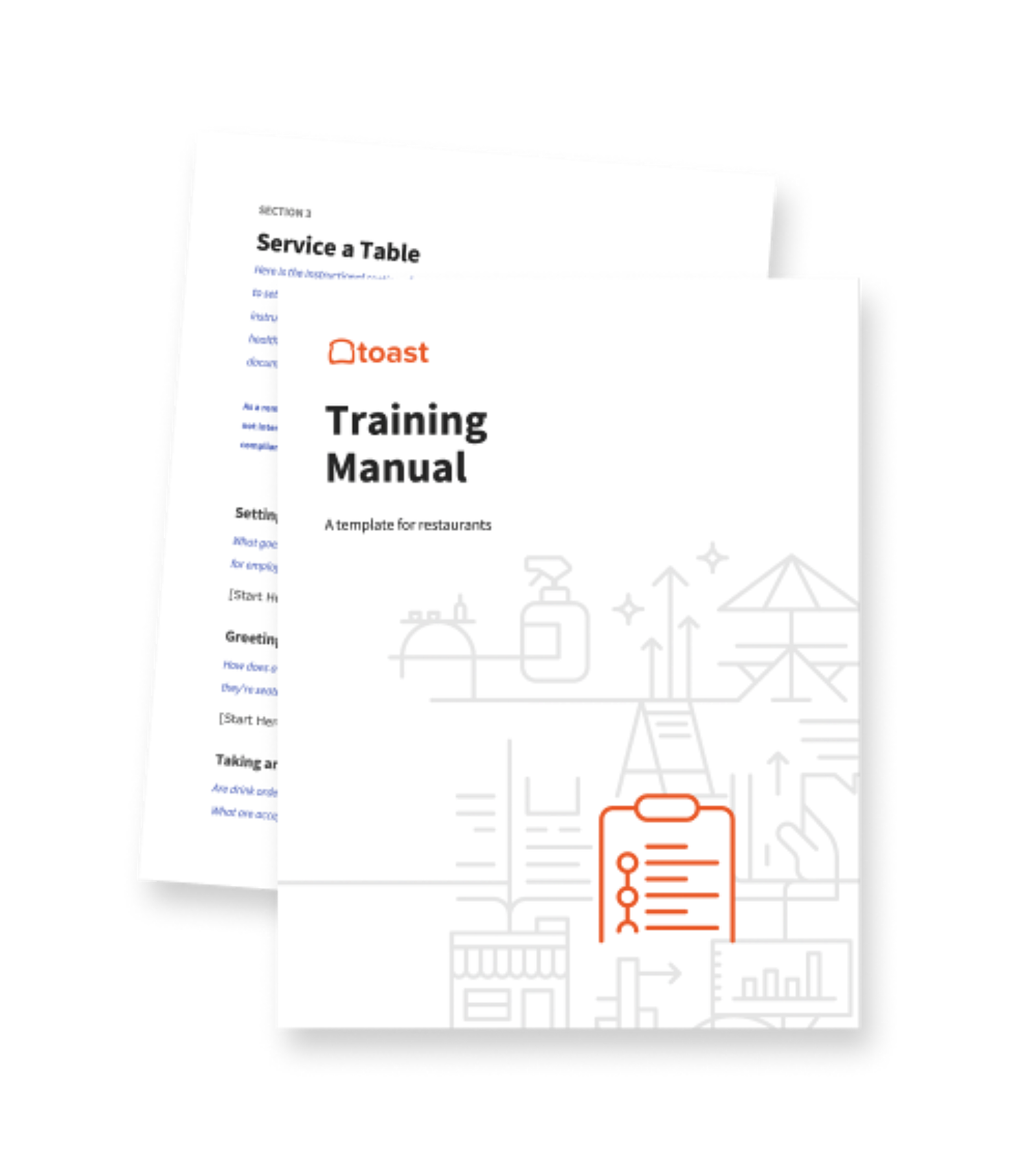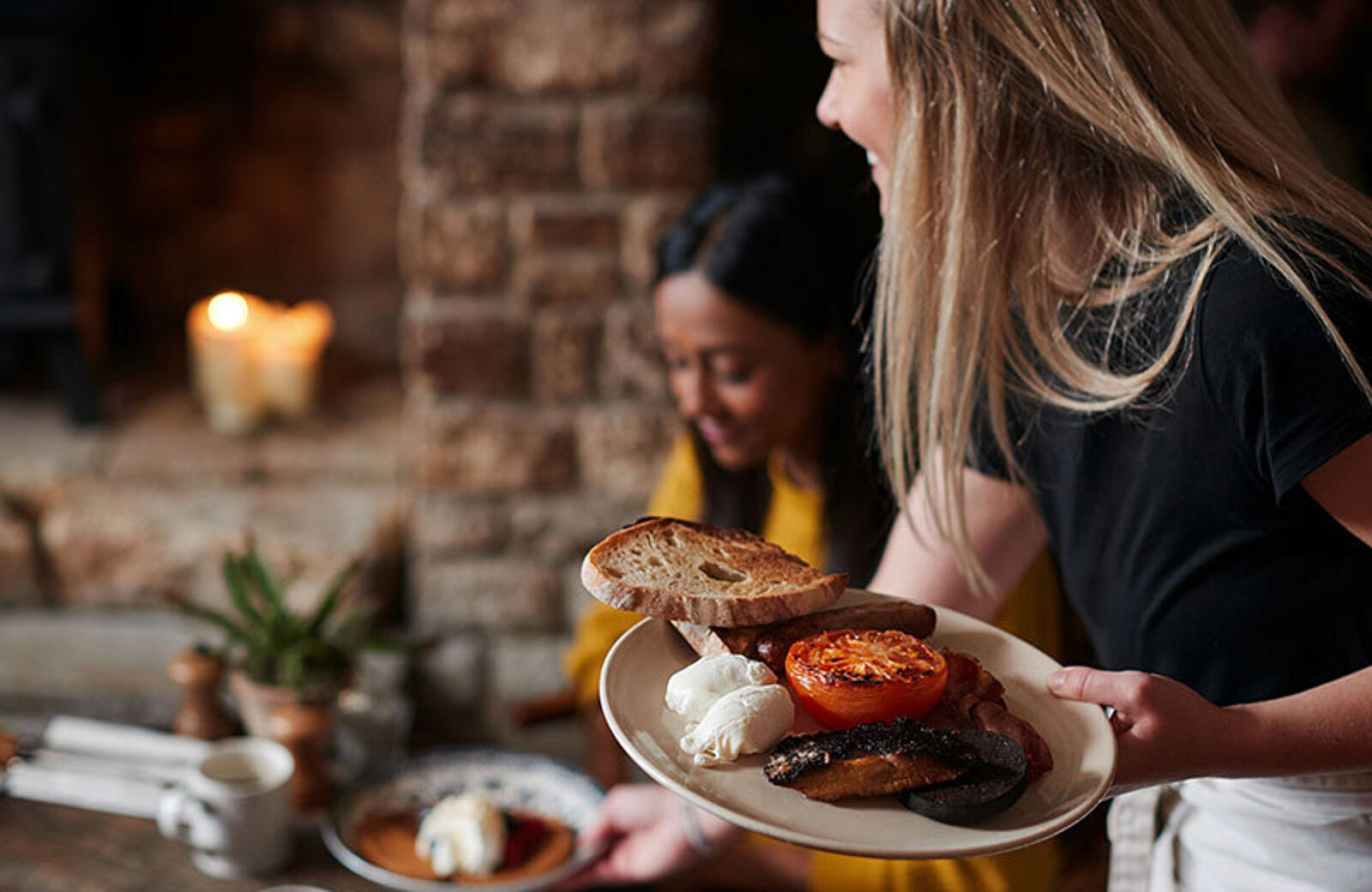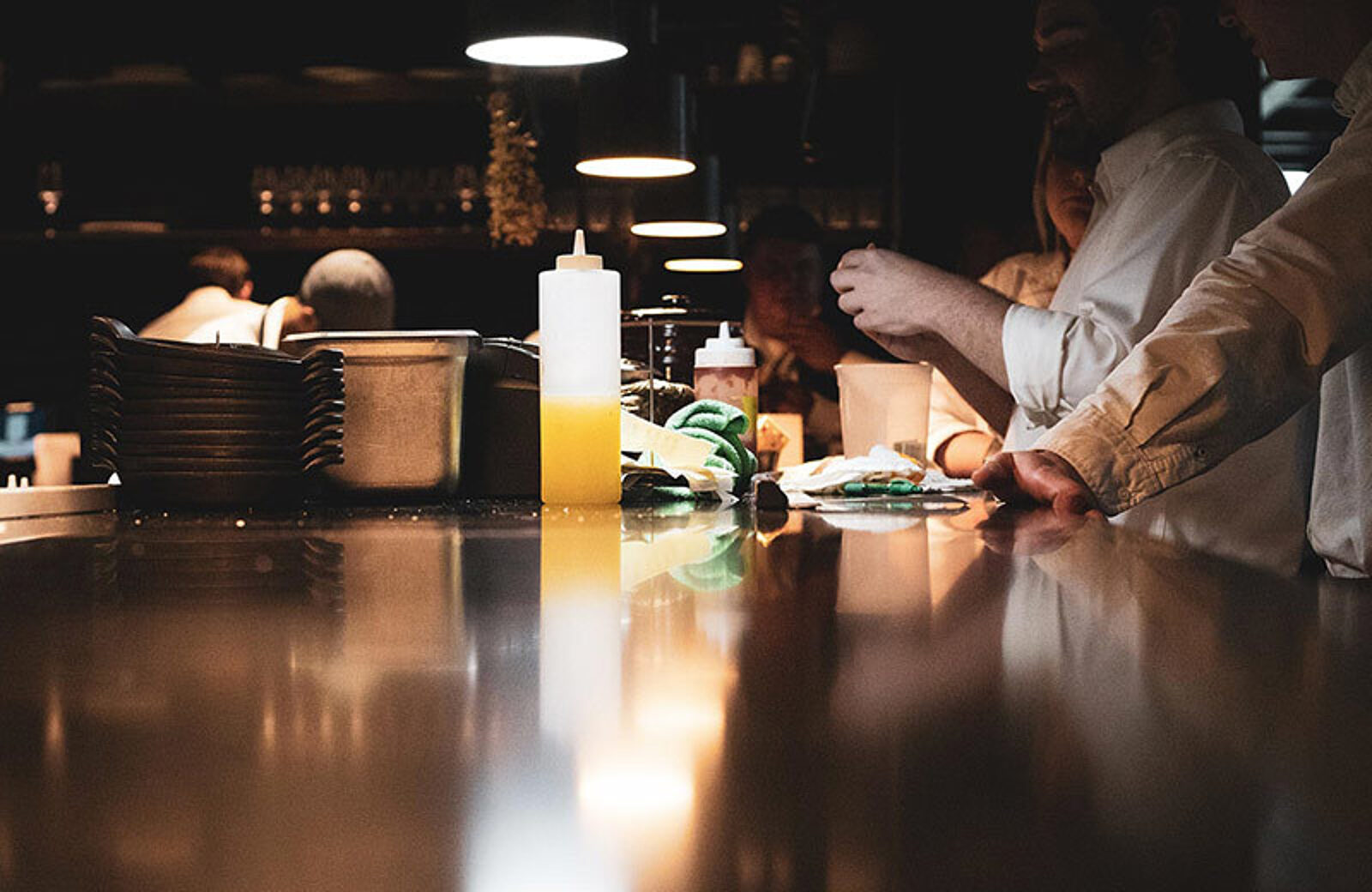
How to Train Staff to Use Soft Skills
Culinary leadership expert Glenn Flood shares four qualities everyone working in a restaurant should master, and how to nurture them in your team.

Liz Schroeter-CourtneyAuthor


Training Manual Template
Use this restaurant training manual template, a customizable Word Doc, to provide your staff with the rules, guidelines, and clarity they need to do their jobs efficiently.
Get free downloadWhat do customers complain about after visiting a restaurant? Oftentimes it’s not that the food was bad but that they were treated poorly by the people working in the restaurant.
In a gripe-o-meter survey from the Consumer Reports National Research Center, the most common complaints about restaurants included:
Impolite or condescending servers
Slow service
Being served meals that weren’t what was ordered
Feeling rushed to leave
If you were getting these complaints about your restaurant, you would think that your employees needed better restaurant staff training, right?
Unfortunately, technical skills training isn’t going to cut it here. That’s because all of these issues are due to poor soft skills training.
In this guide, we’ll tell you how to dial-up soft skills to make your staff more personable, empathetic, and customer-focused so your business reviews will be all about the amazing food, not the crummy service.
What are Soft Skills?
In a restaurant, soft skills refer to personality-driven skills, like:
Communication
Initiative
Attention to detail
A willingness to learn
These are distinct from technical skills which are about following instructions and conducting specific tasks and activities that can be learned through practice.
During new employee onboarding, restaurants will generally focus on training technical skills like greeting a table, sales techniques, preparing and serving certain dishes, and so on because these have an immediate impact on whether and how well a staff member is able to perform their job.
Training Manual Template
Use this restaurant training manual template, a customizable Word Doc, to provide your staff with the rules, guidelines, and clarity they need to do their jobs efficiently.

However, soft skills are often neglected during restaurant training, and that’s understandable: they’re more intangible and difficult to teach. Nevertheless, they should definitely be nurtured during new hire training and on an ongoing basis for your greater front of house team.
A staff member’s ability to learn the above mentioned soft skills is largely based on their personality, so it’s important that personality play a role in your interviews and hiring decisions.
So what does soft skill training and nurturing look like for people working in a restaurant? We asked an expert – Glenn Flood, the training and development chef with Jamie Oliver’s Fifteen in Melbourne and a food producer on Australian MasterChef.
Here’s what Glenn had to say about which soft skills you should prioritize teaching your staff and how.
What Soft Skills Should Restaurants Value the Most?
Soft Skill #1: Communication
Glenn was adamant – communication is the number one soft skill people working in a restaurant should have.
This doesn’t only mean having the ability to communicate with customers – it’s just as, if not even more important, to be able to communicate internally. The kitchen is a hot, busy, chaotic environment, and if staff aren't being openly communicative, that can make a difference between a customer getting their meal on time and everything getting backed up.
Proper communication also helps alleviate the natural divide that can occur between your front and back of house.
“The best restaurants I’ve ever seen are the ones that work on their communication tirelessly," Glenn pointed out. "They promote all inclusive environments and have training and mentoring in place to help create a harmonious workplace.”
How You Can Train Your Staff to Master This Soft Skill
While some managers will rule their restaurant with an iron fist and bark orders to get things done, that isn’t going to encourage an atmosphere of open communication. Yes, it can be tough to communicate calmly during an insane dinner rush, but remember that it’s the management team that sets the tone. Cultivate patience and clarity, and your staff will model this behavior.
Logan Hostettler and his team at The 1894 Lodge in New Washington, IN have made open communication a cornerstone of their management style. As a restaurant in a super small town, there’s no room for people to feel cut off from one another, so he makes sure to create an open, welcoming workplace by using pre-shift meetings as a time to have a judgement-free conversation about topics that may be affecting the team, by creating an anonymous channel in their scheduling app for employees to provide feedback, and by generally having an open-door policy for employees to speak to management about issues within or beyond the restaurant.
Of course the best way to invite communication is to initiate it. Ask staff to speak out if they're having trouble putting together a dish or dealing with a table. Praise workers who are willing to speak up about mistakes. It's better to be aware of problem areas early so you can work around them.
Soft Skill #2: Initiative
At the end of the day, you’re running a business. You depend on sales. If your staff doesn’t show initiative, then it will be hard for your business to thrive.
You can only be one place at a time, and in a restaurant, there’s a million places and things that need addressing at any given moment. If your staff require constant managing and coaching, they’re costing you time, which is costing you money.
“You don’t necessarily want someone who is just responsive,” Glenn said. “You want someone who... will go the extra step and ask, ‘Oh, would you like something sweet with that coffee? We do a fantastic croissant.’ The customer might not take them up on that offer, but they will appreciate the help.”
Staff members who take the initiative and consider themselves self-starters are an asset to your restaurant. When you’re behind the scenes putting out small fires, you can trust that your staff is able to keep the front- or back of house humming along without a hitch. What does initiative look like in a restaurant?
Taking sorted silverware from the dish-pit to the server stations to be rolled
Running orders to tables outside of a server’s section
Running drinks to tables outside of a server’s section
Changing a soda line or keg
Prepping fruit and garnishes for the bar because it’s slow
Pre-portioning sides and ingredients for dinner service
How You Can Train Your Staff to Master This Soft Skill
Create an environment where trust, initiative, and taking risks are rewarded. Your servers and kitchen staff are the ones in the trenches every day; they know the pulse of the business in a way that you may not as well as specific tips and tricks that help them be successful. Their feedback to both management and their fellow staff members about things to try, ways they have improved, or tricks they keep up their sleeve could end up benefiting your daily operations in ways you haven’t even considered.
Consider using the family meal as a routine occasion for sharing tips peer-to-peer on effective ways to upsell, new ideas for improving productivity, or even tweaks to menu items based on feedback from guests. Swapping ideas over a meal can create an informal atmosphere of bonding and sharing that yields helpful results and fosters trust among your team. Be sure to call out and praise good ideas, and never shame the less useful ones. Taking the initiative to suggest something is admirable in any case.
Consider posting tips and tricks from your staff in the staff break area or in the hall leading back to the kitchen to give them inspiration during a shift.
Some businesses also use chat platforms like Slack or Facebook as employee feedback forums, which helps create a strong sense of community. There is so much technology out there that can help you bring out the initiative in your employees – don’t be afraid to use it!
Soft Skill #3: Attention to Detail
Small details mean everything in a restaurant, making organizational skills very important to possess.
According to The Balance, organizational skills “encompass a set of capabilities that help a person plan, prioritize, and achieve his or her goals, which, in turn, can save a company time and money. These skills are essential for multitasking and keeping a business running smoothly and successfully.”
In a restaurant, a lack in organizational skills could spell trouble.
If someone isn't detail-oriented, they won’t see a thumbprint on a glass.
If someone isn't efficient, they won't get a meal plated on time.
If someone can’t prioritize, they will be harried when they serve tables in their section.
“Team members need to be able to set expectations and be accountable for their tasks,” Glenn said. “Not doing this leads to frustration and, ultimately, bad turnover.”
How You Can Train Your Staff to Master This Soft Skill
People can't develop their organizational skills without feedback.
If you notice a member of your staff is having difficulty managing their time, priorities, and responsibilities, chat with them about why this is. Help them set goals and come up with a clear action plan for each shift.
For kitchen staff, teach them how to arrange their workspace so they can maximize their efficiency. For servers, require they memorize the steps of service and keep an organized apron.
Once you’ve got these routines in place, keep checking in with staff to see how they're going, and praise them when you can see their performance improve.
Soft Skill #4: A Willingness to Learn
The final soft skill that’s important for working in a restaurant is curiosity and a willingness to learn new skills.
People who are open to learning are adaptable, which is a must in the restaurant industry where no two days or two hours are the same. Employees who adopt an “always learning” philosophy are also more likely to have a positive attitude and a willingness to take on extra responsibilities for the sake of improving their hospitality skills.
Glenn believes that good leaders promote a culture of collaborative learning that can improve employee retention and create more opportunities to nurture talent and promote from within your team.
“You’re only as good as your weakest link,” he commented. “This is especially important in an industry like ours, which has such high attrition rates.”
How You Can Train Your Staff to Master This Soft Skill
Provide your team with resources that will help them pursue their own learning.
For example, you could give them access to a library of online training videos from Typsy, which would allow them to explore their own areas of interest. You can give them access to your POS system's online training portal and empower them to train themselves and others. Or you could have a learning library in the break room full of books by famous chefs and restaurateurs.
You might look for opportunities for employees to shadow team members in other job functions, or if you’re part of a restaurant group, work a shift at another restaurant to see how they run things. Set up field trips where staff members can visit the local farm where you get your vegetables, or visit the craft brewery that’s a favorite on the menu. Getting a better sense of the network of partners, suppliers and peers they are a part of can build new appreciation for their role and help them convey that knowledge and pride to your customers.
People are also more encouraged to learn when they are exposed to inspiring people, because this shows them how far they could go. So host fun little workshops or inspiring talks in your kitchen. Invite friends from the industry to do a Q&A and give your staff special access to their tips. You might also send team members to a Food for Thought event in your city to hear from local restaurant industry leaders. Not only will this help them improve their skills and knowledge, but it will also boost team morale.
Why are Soft Skills Important for Working in a Restaurant?
The above are just a few of the soft skills you can focus on developing in your team. Just remember: While technical skills are important, the ability to deliver a warm, memorable dining experience marked by genuine hospitality is what will keep your guests coming back again and again.
Related Restaurant Resources
Is this article helpful?
DISCLAIMER: This information is provided for general informational purposes only, and publication does not constitute an endorsement. Toast does not warrant the accuracy or completeness of any information, text, graphics, links, or other items contained within this content. Toast does not guarantee you will achieve any specific results if you follow any advice herein. It may be advisable for you to consult with a professional such as a lawyer, accountant, or business advisor for advice specific to your situation.
Read More
Subscribe to On the Line
Sign up to get industry intel, advice, tools, and honest takes from real people tackling their restaurants’ greatest challenges.



